Thank you for visiting! By the way… any links on this page that lead to products on Amazon and other stores/partners are affiliate links Aquarium Store Depot earns a commission if you make a purchase.
Are you looking to add diversity to your discus aquarium? Well, I believe a discus tank should only accommodate discus fish considering the amount of care and dedication these fish require to live happily.
However, in your quest for finding perfect tank mates for discus, you will find as many points of view as there are Discus keepers. Therefore, in this article, I’ll list 15 of the best tank mates for discus fish and support them with logical facts.
Let’s dive in.
How To Choose Discus Tank Mates?
For choosing discus tank mates, you should consider the following factors:
Temperament
Discus fish are naturally shy, timid, and calm. Hence, they enjoy a calm and peaceful school around them. While choosing the tank mates, always avoid keeping tank mates that may turn out “bullies” for your discus fish. Discus tend to only be aggressive to their own kind, as shown below in the video by fishwatertanks.
Therefore, you should never add larger fish species and aggressive fish to your discus tank.
Size
Discus fish prefer small schooling fish in a nice display tank such as Characins. In a discus aquarium, when your fish will sense Characins in it, they will come out naturally because they assume they’re safe to swim with Characins in the open.
I recommend keeping a large school of Characins including Neon tetras, Cardinal Tetras, and Rummy Nose Tetras that imitate the natural habitat of discus fish and thrive together in the same water quality. Since Discus fish are mid feeders, I also recommend keeping them with bottom feeders small fish species such as Corydoras.
Competition
It’s vital to consider tank mates that would not dominate and outcompete the Discus fish for food.
Also, discus fish are slow eaters. Therefore, all avoid fast eaters as the discus fish tank mates and avoid fish that are normally calm, but get enthusiastic or aggressive at feeding time.
Tank Environment and Setup
Discus fish are not like your average tropical freshwater fish, they require optimal tank environment and care. Therefore, discus fish are not ideal for novice aquarists. Discus fish prefer warmer temperatures around 85 to 86 degrees, which is a lot for other tropical fish. So, always choose the tank mates for discus that can tolerate warmer temperatures.
Other than temperature, there are other tank factors that should be considered before choosing discus tank mates.
- Tank size
- Food
- pH and water hardness
- Water flow
15 of the Best Aquarium Companions
While keeping the above-mentioned factors in mind, I’ve prepared a list of 15 great discus tank mates that would get along with your discus fish nicely.
Here’s a list of my favorite discus tank mates that get along with each other nicely and calmly. If you prefer a video, you can check out the video on our YouTube channel. If you like this content, be sure to subscribe!
1. Siamese Algae Eater
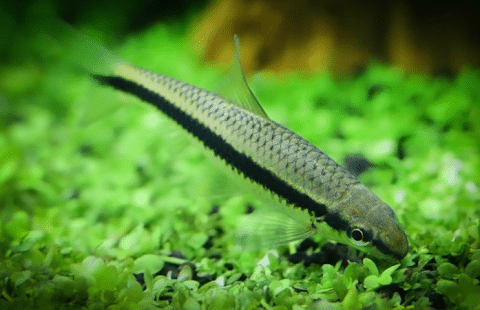
- Scientific Name
- Adult Size: 6 inches
- Compatibility: Peaceful fish
- Water Temperature: 72 – 82 degrees
- Minimum tank size: 20 gallons
- Care Level: Easy
- Diet: Omnivore
- Origin: Southeast Asia
- Swimming Level: bottom
Siamese algae eaters belong to the family Cyprinidae and they are colloquially referred to as the Carp family1. They are bottom-dwelling algae that novice aquarists usually confuse with plecostomus or the Chinese algae eater. The Siamese algae eaters are native to the main lands of Southeast Asia such as the Mekong and Chao Phraya Rivers.
The Siamese algae eater is a medium-sized species of the Carp family that reaches a maximum size of around 6 inches in captivity. The body of the Siamese algae eater is slender torpedo-shaped with a single horizontal stripe in front of its eyes and transparent body.
They make good tank mates with Discus fish as they are peaceful fish species and mostly oblivious of the activities of upper-level fish in the community tank. Also, like many other bottom dwellers, the Siamese algae eaters are not aggressive and territorial.
The other factor that makes the Siamese algae eater the best tank mates for discus is their tank size requirement, which is around 20 gallons.
2. Dwarf Gouramis
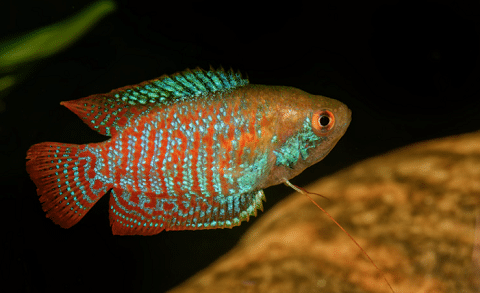
- Scientific Name: Colisa Lalia
- Adult Size: 4 – 4.5 inches
- Compatibility: Peaceful fish, widely compatible
- Water Temperature: 72 – 82°F
- Minimum tank size: 10 gallons
- Care Level: Moderate
- Diet: Omnivore
- Origin: India, West Bengal, Assam, and Bangladesh
- Swimming Level: 80% bottom-dwelling
The labyrinth fish or Dwarf Gouramis are tropical freshwater fish originating from India, Burma, and Borneo that add colors to your home aquariums. The males in these species are more colorful than females with pointed dorsal fins. Females, on the other hand, are more silvery with round dorsal fins.
Dwarf Gouramis make good discus tank mates as they are peaceful and docile that prefer warmer temperatures and a larger tank of around 10 gallons. However, they need access to the surface air to breathe air. Hence, they are ideal for beginners.
Like discus fish, Dwarf species are also vulnerable to diseases. So, proper filtration and a nutritious diet are required to keep them happy, healthy, and thriving.
3. Harlequin Rasbora
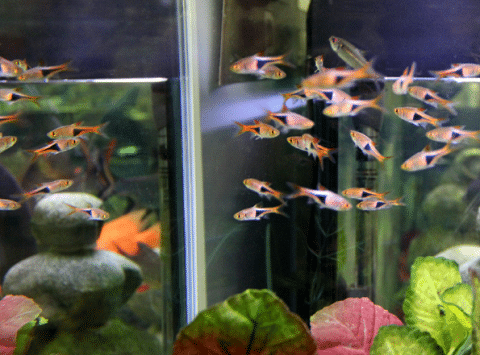
- Scientific Name: Trigonostigma heteromorpha
- Adult Size: 1.75 inches
- Compatibility: Peaceful, compatible for a community tank
- Water Temperature: 73 to 82 F
- Minimum tank size: 10 gallon
- Care Level: Intermediate
- Diet: Omnivore
- Origin: Southeast Asia, Malaysia, Singapore, Sumatra, Thailand
- Swimming Level: Top to mid-dwelling
Harlequin Rasbora or the Red rasbora are delightful and peaceful fish species originating from Singapore, Sumatra, and some parts of Thailand, usually seen around small streams. They prefer water to be soft, acidic, and low in total salts, which makes them ideal tank mates for the Discus fish.
Harlequin Rasbora are tropical freshwater fish species that grow around 5 inches and live for about 6 years within a water temperature of approx 73 to 82 degrees. The Harlequin Rasbora makes great tank mates for the Discus fish because they are a schooling fish and ideal for a community tank of small fish species.
4. Rummy Nose Tetra
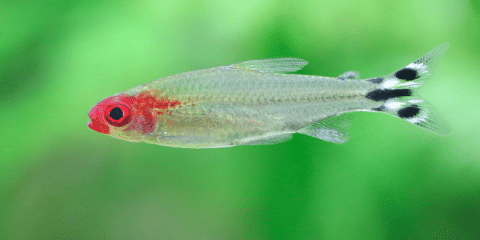
- Scientific Name: Hemigrammus rhodostomus
- Adult Size: 2-2.5 inches
- Compatibility: Peaceful community fish
- Water Temperature: 75 to 85 degrees
- Minimum tank size: 20 gallons
- Care Level: Intermediate
- Diet: Omnivore
- Origin: South America
- Swimming Level: Middle and lower
Rummy nose tetra is gentle and a popular aquarium fish with a unique appearance that will leave you in awe.
There are three types of fish under the Rummy nose Tetra species. Out the which, the primary Tetra or Hemgrammus Rhodostomus are true Rummy nose tetras. The Rummy tetras are native to Amazon Basins and the Orinoco river in Brazil and Venezuela.
Rummy nose tetras are small fish around 2 to 2.5 inches long, ideal for a Discus tank. They have a very calm and peaceful temperament so they like to enjoy their own company. Also, they are a schooling fish that reside in the middle section of a fish tank in a group of 6 or more.
5. Cardinal Tetra
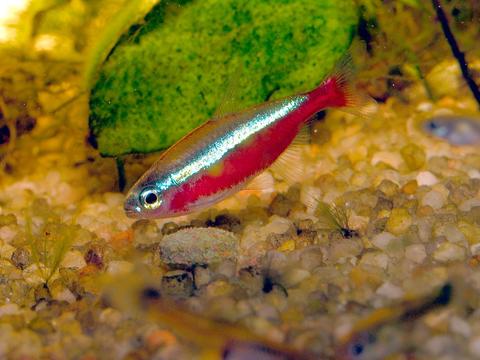
- Scientific Name: Paracheirodon axelrodi
- Adult Size: 2 inches
- Compatibility: Peaceful fish, suitable for a community tank
- Water Temperature: 73 o 81 degrees
- Minimum tank size: 20 gallons
- Care Level: Moderate
- Diet: Omnivore
- Origin: Brazil, Colombia, and Venezuela
- Swimming Level: Top to mid-dweller
Cardinal tetras enhance the beauty of your aquarium adding the extra red color and exceptional movement in your fish tank.
They originate from South America and are a very common fish species among aquarists. One major reason for the popularity of Cardinal tetras is their hardy nature, which is easy to maintain for beginners. However, despite being a hardy freshwater fish, Cardinal tetra is difficult to breed in captivity.
The body of Cardinal tetra is adorned with a blue line and red stripes that are longer. Therefore, their name “Cardinal Tetra” is derived from this red color that resembles the red robes donned by the cardinals.
They are compatible tank mates for Discus fish because they only grow up to 2 inches in length and have a shorter life span of around 1 year or so. Because they are smaller freshwater fish, they only require a tank as small as 20 gallons. When it comes to temperament, they are peaceful species that can be kept in community aquariums without worry. They usually stay in the middle of the water so you can keep Discus fish with them easily. Also, you can keep Cardinal tetras with Discus because they require high water temperature.
6. Neon Tetra
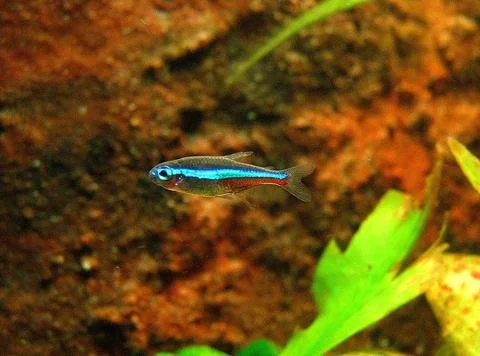
- Scientific Name: Paracheirodon innesi
- Adult Size: 1.5 inches
- Compatibility: Peaceful community fish species
- Water Temperature: 72 – 76 degrees
- Minimum tank size: 10 gallons
- Care Level: Easy
- Diet: Omnivore
- Origin: Tropical freshwater rivers and streams in South America.
- Swimming Level: Mid-upper level
Fun fact: The neon tetra (innesi) is named after William T. Innis who was an acclaimed American aquarist.
Neon Tetras are one of the most popular aquarium fish, reaching a maximum length of over 1.5 inches.
Novice fish keepers can hardly differentiate between a Neon tetra and a Cardinal tetra because of their uncanny resemblance. However, the distinguishing factor is in the red stripes. If the stripes are short, the fish is Neon Tetra.
The Neon Tetra is a freshwater tropical fish that mainly originates from the Amazon river. Therefore, it prefers moderately warm water of around 76 degrees with rather soft and acidic water, having a pH ranging from 5.5 to 7.4.
The best thing about Neon tetras as Discus tank mates is they are a schooling fish that appreciates living in a group of at least ten or more. They are not solitary fish and if kept alone, they will die of stress and loneliness. Neon tetras are a peaceful species and can be kept easily with other non-aggressive fish such as the Discus fish.
7. Pencil Fish
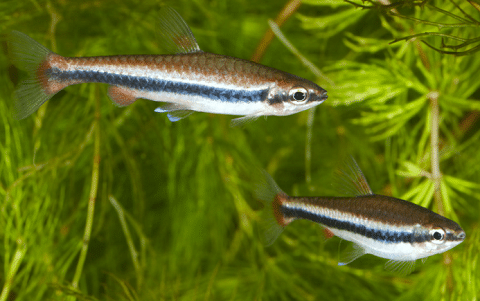
- Scientific Name: Lebiasinidae
- Adult Size: 1.5 to 2 inches in length
- Compatibility: Community tank, compatible with Discus fish
- Water Temperature: 72- 78 °F
- Minimum tank size: 10 gallons
- Care Level: Intermediate
- Diet: Omnivore
- Origin: Near Santa Elena, particularly in the river Rio Tigre and in Peru
- Swimming Level: usually Top level
Pencil fish are small aquarium fish that is a bit timid and enjoys their time with fellow small and dwarf fish. They are slow swimmers so make a great discus tank mate that will allow your discus fish to have plenty of feeding time.
The natural habitat of pencil fish is near Santa Elena, mainly in the Rio Tigre river and in Peru.
They enjoy spacious space with a well-planted environment so feel free to decorate your discus aquarium with live plants and lots of hiding places.
As discus, the pencil fish accepts all kinds of food but since they have small mouths, the food needs to have a suitable size.
8. Pleco Fish
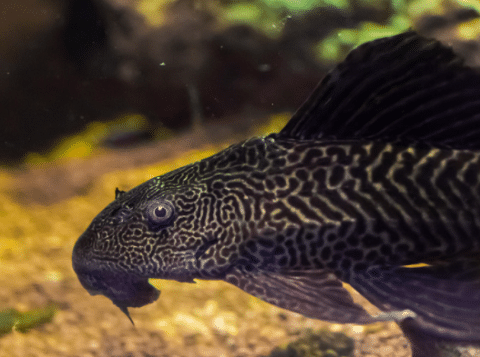
- Scientific Name: Hypostomus plecostomus
- Adult Size: 1.5 to 12+ inches long (depends on species)
- Compatibility: Compatible
- Water Temperature: 72 to 82 degrees
- Minimum tank size: 20 gallons (depends on species)
- Care Level: Intermediate
- Diet: Mostly omnivore
- Origin: South America
- Swimming Level: Bottom level
Note: Pleco fish species cover over 150+ types, but for the sake of this article about Discus fish tank mates, we will target only the small pleco species.
Pleco fish are bottom-feeding algae eaters freshwater fish that have sucker-shaped mouths and bony plates all over their bodies. They are South American fish, originating from the Amazon Jungle.
Plecos are usually called Janitor fish because they are scavengers and eat almost everything available to them. Hence, ideal for beginners. They prefer warmer temperatures and are extremely territorial with other Plecos. Thus, it’s recommended to keep one Pleco at a time in a Discus fish tank.
9. Corydoras Catfish
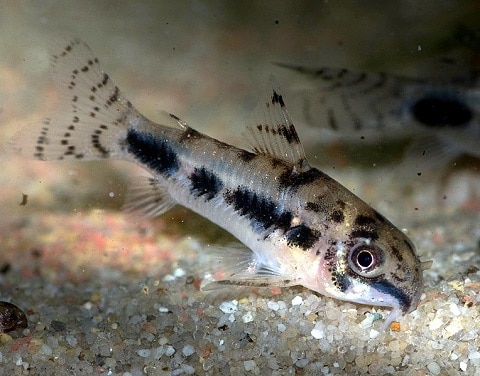
- Scientific Name: Corydoras paleatus
- Adult Size: 4 inches
- Compatibility: Peaceful species
- Water Temperature: 78 degrees
- Minimum tank size: 10 gallons
- Care Level: Easy
- Diet: Omnivore
- Origin: Regions across South America
- Swimming Level: mostly bottom dwellers
Corydoras catfish are a kind of fish that experienced aquarists always insist on keeping because they are very popular in America.
They are extremely peaceful and never bother other aquarium fish. Corydoras are bottom-dwellers and are mostly busy searching for food at the bottom. One big reason they are good tank mates for Discus is that they generally do not grow more than 3 inches in length and enjoy the company of fellow Corydoras and other fish including the Discus fish.
The water parameters required by the corydoras are much like the Discus fish. They prefer warmer temperatures.
10. German Blue Ram Cichlids (with caution)
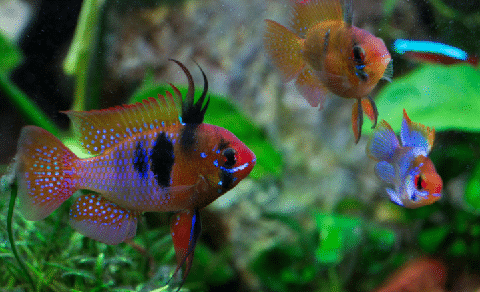
- Scientific Name: Mikrogeophagus Ramirezi
- Adult Size: 2-3 inches
- Compatibility: Peaceful with caution
- Water Temperature: 78 to 85 degrees
- Minimum tank size: 20 gallons or above
- Care Level: Intermediate
- Diet: Omnivore
- Origin: South America, usually found in the Orinoco River basin in both Venezuela and Colombia.
- Swimming Level: Mid, bottom-dweller
I recommend keeping German blue rams in a discus tank because of their amazing pop of color and peaceful nature, which is contrary to other cichlids. The German blue rams are small freshwater aquarium fish that do not go beyond 2-3 inches. Hence, make the best tank mates for your discus fish.
However, I advise keeping German blue ram and Discus fish with caution as German blue rams like to form their own territory, it is recommended to provide plenty of cover towards the bottom of the tank in the form of pots, caves, and other rocks.
11. Freshwater Angelfish (with caution)
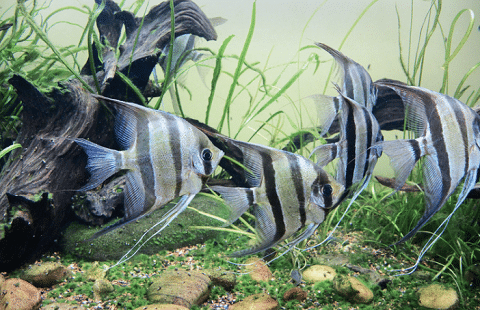
- Scientific Name: Pterophyllum
- Adult Size: 3–4 inches
- Compatibility: Semi-aggressive, compatible with caution
- Water Temperature: 75–82°F
- Minimum tank size: 20 gallons
- Care Level: Moderate
- Diet: Omnivore
- Origin: Tropical South America
- Swimming Level: Mid-level fish
By now, you must have figured out that Discus fish cannot live alone. They have a tendency to move slowly in schools and shoals and thus they need tank mates to entertain them. Freshwater angelfish make the best discus tank mates because they are a lot alike in their behavior, movement, and feeding habits.
However, to keep angelfish and Discus fish together, you need to take some precautions because angelfish can become aggressive and territorial at the time of feeding and breeding. So, you need to make sure that your Discus fish are well-fed if particularly kept with freshwater angelfish.
I adore freshwater angelfish but I would not recommend keeping them with Discus if you are a beginner. That’s because angelfish can grow large and bully Discus at the time of feeding. If you want to keep them together in the same tank, go for a larger tank to control their temperament, change the decors in your tank so they don’t become territorial, and add a wholesome amount of rocks, plants, and other hiding places for your discus fish.
12. Rainbow Fish
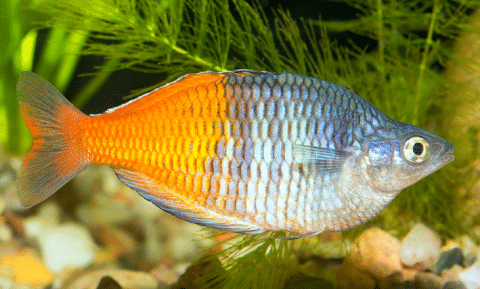
- Scientific Name: Marosatherina ladigesi, Melanotaenia splendida, Melanotaenia boesemani, Melanotaenia lacustris, Glossolepis incisus, Bedotia geayi, Melanotaenia praecox, Melanotaenia herbertaxelrodi, Iriatherina werneri
- Adult Size: 2-6+ inches long, depending on species
- Compatibility: Peaceful community fish
- Water Temperature: 72-82°F
- Minimum tank size: 30+ gallons
- Care Level: Intermediate
- Diet: Omnivore
- Origin: Australia, Madagascar, New Guinea, and Sulawesi.
- Swimming Level: Middle to upper level
Rainbow fish are beautiful fish that are peaceful, docile, and complements Discus fish considering their temperament and required water parameters.
Rainbow fish is a group of over 50 different species, mainly originating from Australia, Madagascar, New Guinea, and Sulawesi. They are small fish of around 2 to 6 inches long that loves a lot of free space for easy swimming. Like discus, they need to be kept in large aquariums with several plants and other hiding places.
Rainbow fish and Doscus are compatible in a way that their water requirements are the same. Rainbow fish enjoys warmer water temperatures around 76º F and 82º F and like to live in large groups. Therefore, it’s recommended to keep a school of 5 or more rainbow fishes in the tank to keep them healthy and happy.
13. Clown Loaches
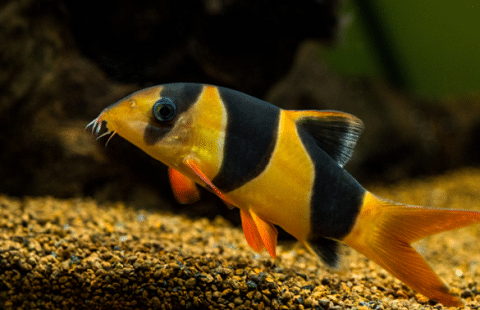
- Scientific Name: Chromobotia macracanthus
- Adult Size: around 12 inches
- Compatibility: Peaceful community fish
- Water Temperature: 75 to 85 degrees
- Minimum tank size: 100 gallons
- Care Level: Moderate
- Diet: Carnivore
- Origin: Indonesia
- Swimming Level: Bottom level
Clown loaches are easy to care for and extremely hardy fish species, appropriate for aquarists of any skill level. They originate from the inland waters of Indonesia, particularly Borneo and Sumatra.
They are peaceful freshwater fish with a vibrant appearance that depicts their name pretty well. Clown loaches also thrive at the same warm water temperatures that Discus enjoys. However, I always list them as the controversial tank mates for Discus as they can grow quite large, which is not ideal for Discus.
14. White Cloud Mountain Minnow
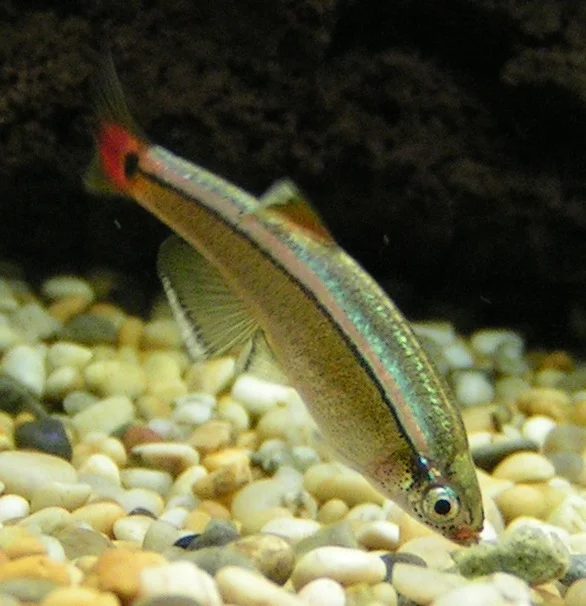
- Scientific Name: Tanichthys albonubes
- Adult Size: 1 ½ inch
- Compatibility: Peaceful; Schooling
- Water Temperature: 60 to 72 degrees
- Minimum tank size: 10 gallons
- Care Level: Easy
- Diet: Omnivore
- Origin: White Cloud Mountains of China
- Swimming Level: Top to middle
The White cloud mountain Minnow, as the name, suggests originates from the white cloud mountains of China. It’s a popular aquarium fish that is colorful, peaceful, docile, and hence, the best community fish for Discus.
However, they prefer cooler temperatures which may be a hindrance in keeping them with Discus fish. They can survive with Neon Tetras and other tropical fish species but with Discus, when temperatures reach above 72F, they become stressed and pale with washed-out color. For white cloud mountain minnow, cool water is preferred as it brings out their vibrancy and brightness. They are very adaptable fish if you give them time.
15. Bloodfin Tetras
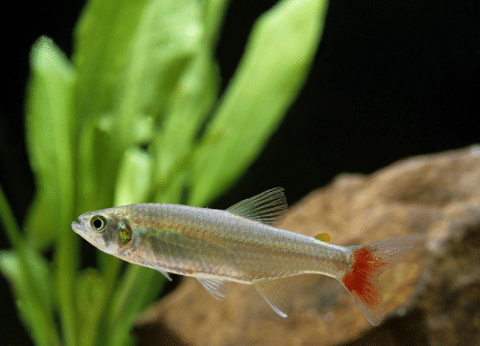
- Scientific Name: Aphyocharax anisitsi
- Adult Size: 1.5 to 2 inches
- Compatibility: Peaceful
- Water Temperature: 70 to 80 degrees
- Minimum tank size: 30 gallons
- Care Level: Easy
- Diet: Carnivore
- Origin: The Paraná River, or Rio Paraná river in South America
- Swimming Level: Bottom level
Like White Cloud Mountain Minnows, Bloodfin tetras enjoy cool fresh water tank conditions. Therefore, if you’re an inexperienced aquarist, I don’t recommend keeping them with Discus fish.
Also, bloodfin tetras are active swimmers, buzzing in groups and rarely aggressive during feeding hours. Apart from that, they are peaceful fish, swimming in the upper and middle level of the tank and getting along with discus fish pretty well.
Fish To Avoid
Before listing down the worst tank mates for discus fish, please know that any large, aggressive fish that are active swimmers are not recommended to keep with the Discus fish. As I mentioned, angelfish and Clown loaches are very controversial to keep with discus, but any experienced aquarists can handle them well with care.
However, there are a few fish that should be avoided at any cost to raise happy and healthy discus fish.
- Aggressive barbs like Tiger Barbs
- Goldfish
- Aggressive Cichlids
FAQS
What Other Fish Can Be Kept With this fish?
You can keep almost all kinds of tetras including silver tip tetra, rummy nose tetra, neon tetra, ember tetra, and Cardinal tetras with your discus fish. Additionally, you can also keep Apisto Agassizi, Siamese algae eater, Pencil Fish, Loaches, Panda Cory, Corydoras Sterbai, Marbled Hatchetfish, Assassin Snails, and German Blue Ram in your Discus fish tank.
Can I Put Them In A Community Tank?
Of course, you can put Discus fish in a community tank because discus fish thrive in a community tank with other compatible tank mates that are peaceful, calm, slow swimmers and eaters that enjoy the same water parameters as the discus fishes.
Do They And Angelfish Get Along?
Yes, they do. However, with caution. First of all, be informed that discus and freshwater angelfish are compatible. If you’re planning to keep saltwater angelfish in your Discus tank, think again as it won’t survive for long.
Furthermore, Freshwater Angelfish can become aggressive and territorial at the time of feeding and breeding. So, you need to make sure that your Discus fish are well-fed if particularly kept with freshwater angelfish.
Also, larger Angelfish can bully Discus at the time of feeding. If you want to keep them together in the same tank, go for a larger tank to control their temperament, add plenty of decor in your tank so they don’t become territorial, and add a wholesome amount of rocks, plants, and other hiding places for your discus fish.
Can You Put Bettas With This Type of Fish?
Keeping Bettas with discus is possible, but not recommended because Discus fish is very sensitive to aggressive behavior and male bettas can get very aggressive.
If you want to keep Bettas in a Discus tank, go for female Bettas as they function much better in a community tank. However, constant monitoring is a must.
Will They Attack Their Tank Mates?
No. Discus will typically not attack their tank mates as they are not aggressive and known as a peaceful fish for home aquariums. Therefore, they never should be housed with aggressive or semi-aggressive fish as they are sensitive to aggression. If any of your fish in the Discus tank shows signs of aggression, it is recommended to remove it as soon as possible because it may stress your Discus and a threatened Discus is vulnerable to diseases and other problems.
Final Thoughts
Discus fish are beautiful, peaceful, and docile fish that appreciates a well-planted community tank with compatible tank mates. While choosing the best tank mates for discus fish, remember to always opt for a large community tank with enough greenery and hiding spots to provide your aquarium fish with enough entertainment.
- About the Author
- Latest Posts
I’m thrilled that you found Aquarium Store Depot! Here you’ll find information on fish, aquariums, and all things aquatics related. I’m a hobbyist (being doing this since I was 11) and here to help other hobbyists thrive with their aquariums! I adhere to a high quality Editorial Process and Review products with real life field usage and practical analysis.

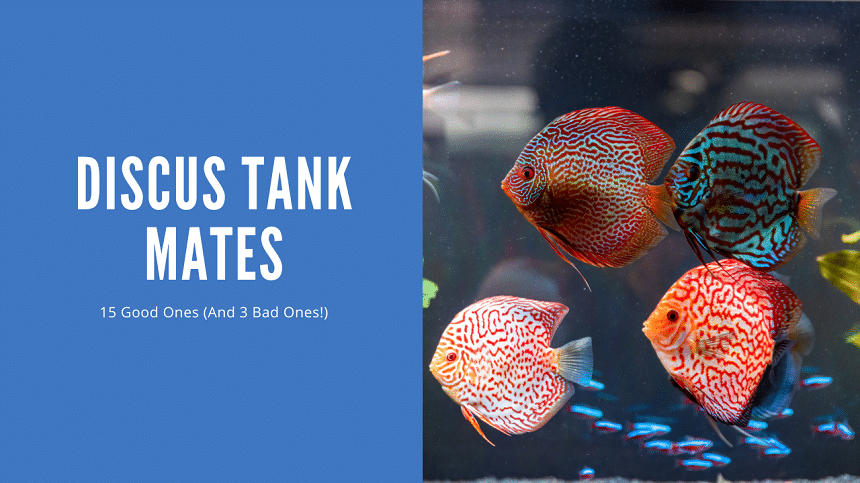

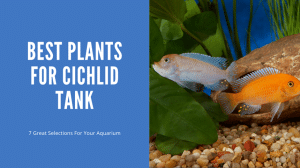
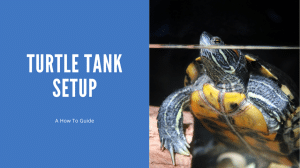
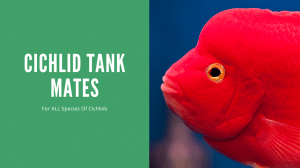
thanks Mark for your advice on what fish I can put with discus as iv just set up and 0 ammonia 0 nitrites and now I’m ready to go soon as xmas is gone lol
Any of those fish on this post will work, but my favorites would be ram cichlids and rummy nose tetras.
Is there any specific reason why your fav to be kept with discus is rummy nose tetra? Because usually I read a lot of of blog said cardinal tetra is the best. Just asking since I’m a newbie in keeping discus hahah
Hi Haikal. It’s because Rummy Noses are easier to care for and a near universal fit for most community fish tanks. Cardinals are more sensitive than Neons. While discus are sensitive themselves, I would prefer aquarists to other deal with one sensitive species over several.